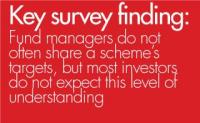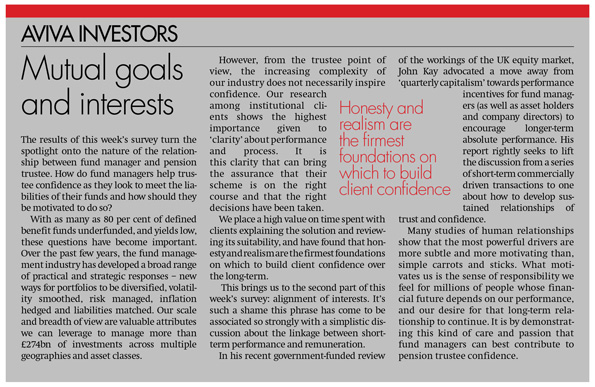Investment intelligence: the trustee confidence index – relationships with fund managers
Are fund managers aiming for the same goal as the pension schemes that hire them, and do they inspire confidence in the trustees, David Rowley asks PW’s panel of experts from across the UK.
Do you feel fund managers share your objectives and requirements? This is, admittedly, a leading question. If you ask a group of investors in a grim investment environment whether others feel their pain, then some of their answers are likely to be curt.
There is also a sang-froid acceptance that it is not the job of a fund manager to share individual investor objectives.
“They don’t share our objectives, but then I don’t see why they should – we have to pay pensions, they have to invest our assets to meet our requirements.”
Their objective is to earn fees and try to retain the money. I don’t think either side misunderstands each other
“They have their own objectives simply to outperform their specific benchmarks. That’s all we want from them.”
These are the pragmatic views of the chief executive of a public sector pension fund and James Churcher, pensions manager at Abbott, respectively.
Though at times, the matter-of-fact way trustees and scheme managers describe the people who invest on their behalf cannot make for comfortable reading for the asset management industry.
As one private sector pension scheme manager put it: “Their objective is to earn fees and try to retain the money. I don’t think – while relations are friendly – either side misunderstands each other.”
“Fund managers are motivated by self-interest. They therefore have little or no interest in whether our scheme meets its objectives,” was how one representative of a public sector scheme put it.
An interim pensions manager complained that fund managers’ main interest was in selling ‘interesting funds’ rather than helping trustees and pension managers to fulfil their obligations.
Another complaint is that fund managers do not share pension funds’ objectives because they do not understand them.
Conversely, the trustee of a DC scheme lamented the lack of engagement with passive equity managers.
“To some extent there is no personality to fund management. They neither feel credit when the fund performs well, nor the opposite in the time of loss. They generally just applaud themselves on following an index and take a fee for it.”
Alternative view
“We have managers for very discrete mandates and it is quite difficult for them to have a sense of the broad picture of asset-liability matching and asset allocation.”
There is also the view, this one expressed by the trustee of a single sponsor’s DC and DB schemes, that many managers are only a cog in the machine of a pension fund’s assets and liabilities.
This comment was heard by the trustee of a FTSE 100 company scheme with more than 20 individual fund managers. “Not all of those 20 managers’ targets is to beat the scheme’s liabilities; some of them are merely to beat benchmark equity returns,” he said.
The last word went to Alan Pickering, chairman of the Plumbing Pension Scheme who, in reponse to the question ‘Do you feel fund managers share your requirements and objectives?’, favoured schemes taking the initiative.
He says: “It is our job to make fund managers understand how their performance fits into our overall requirement. Provided we are confident we have got the message across we will tolerate temporary underperformance, but if they are oblivious to our objectives and their role in fulfilling those objectives they will not stay with us for long.”
A mention should go to the two trustees of schemes that have chosen a fiduciary management approach. Both gave some of the most positive answers.
One of them was Malcolm Curzon, chair of trustees at Habitat, who said: “We have a fiduciary management model and they are very much a partner in this. Previously, fund managers were there to invest and they would keep to their mandate and try to achieve an objective in terms of purely investment return.”
How are fund managers contributing to trustees’ confidence in meeting funding obligations and/or members’ expectations?
Given depressed markets, only a few pension schemes are likely to have benefited from a performance so stellar they are going to be praising their fund managers to the skies.
Furthermore, the steady decline of gilt yields has taken the gloss off schemes that have picked good managers and a clever mix of asset classes.
As the chief executive of a public sector scheme says: “The risk to my levels of confidence is not from our fund managers – however hard they work the driver of the funding position is gilt yields.
“Our fund managers, other than meet their targets, can do little to assist.”
Similar comments were made by Andrew Bradshaw, independent trustee at Ross Trustees, who when speaking about one of his major clients, said: “Our fund managers have done quite well, but this is dwarfed with what is happening on gilt yields.”
For some scheme representatives, there was a mixture of emotions about their different managers.
“We’ve got a couple of good managers in the fixed income space who prosper in good or bad times. But I’m not sure the equity managers have that great confidence themselves that their asset class is going to perform, or indeed that they are going to be able to consistently beat the benchmarks they’re set,” said one pension scheme manager.
A similar message was heard from a DB scheme trustee, who said: “We have a lot of passive in the equity space now anyway. In developed markets, it’s really difficult for active managers to outperform the index over fees. Volatility does create opportunity for really good managers but it also creates a lot more risk of getting it wrong.
“One of the massive challenges is finding the right ones. Our long-term track record along with other schemes is not particularly hot at finding the managers that can do it.”
The trouble with fund managers is they follow the benchmark and will do anything to beat that. There is quite a lot of money wasted in overtrading
For the larger schemes, particularly those with chief investment officers, there was the feeling that confidence was created by their own strategies and asset allocation, rather than coming from the fund managers.
“We are more focused on the aggregate impact of all of our investment decisions than on any single manager impact,” said Carol Young, pension manager at Heineken.
A FTSE 100 scheme trustee said fund managers did not add to his confidence as he reaches decisions independently of them.
“Views on setting the asset strategy to hopefully deliver the returns we want is done more in conjunction with both in-house staff and our investment consultant. We get more [confidence] from those two sources than from the actual fund managers.”
For some, though, the cross-purposes of fund managers and pension funds has caused a lack of confidence in meeting their liabilities and/or members’ expectations.
The manager of a FTSE 250 DB scheme said: “The trouble with fund managers is they follow the benchmark and will do anything to beat that. There is quite a lot of money wasted in overtrading. While it does add a lot of value quite often, you sometimes wonder that instead of trading if you held the bond to maturity, if they have managed 200-300 basis points above gilts... there is a disconnect between what we want and what a manager will do for you.”
Again, coming at this from a completely different perspective was Pickering. He saw fund managers as helping to boost confidence through their educational role for trustees.
“This is something that is so often overlooked,” he said. “So many trustees have an adversarial relationship with their fund managers; we want a collaborative relationship and we are happy to use their input for training and broadening our investment horizons. So they are contributing in a non-standard way. We tap into their expertise as best we can.”
Most Viewed
- What does Labour have in store for the pensions industry?
- LGPS latest: GLIL backers invest £475m for UK infrastructure push
- Dashboard costs rose by 23% in 2023, figures show
- Border to Coast launches UK strategy in major private markets push
- How the pensions industry can better support people with mental health problems



